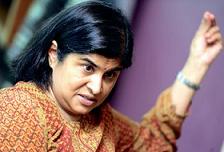Will the rampant Islamophobia never end? Malaysia's ruling Muslims, lauded by Senators McCain and Lieberman
as a model government for all Muslims to follow, somehow have the
mistaken idea that Islam is not compatible with 'Western liberal
thought' and freedom. Imam Rauf, call your office! From "DPM: Nation's
future depends on Malay unity", The Star, 9 June 2012:
PUTRAJAYA: Deputy Prime Minister [DPM] Tan Sri Muhyiddin Yassin today said Malaysians cannot refute the fact that the future of the nation depended on the unity of the Malays and Muslims who formed the majority.
He emphasised that if the Muslims split due to differences in politics or other fundamental issues related to religion then it would be difficult to achieve peace and unity for the nation as a whole.'No Muslim 'unity', no peace'. No, that did not sound like a threat.
"Therefore I'm of the opinion that efforts to strengthen the race is something very important in ensuring stability, peace and harmony in our country," he said in a speech to launch the "Upholding of Islam and Strengthening of the Race" Convention, here today.
The speech was read out by minister in Prime Minister's Department Datuk Seri Jamil Khir Baharom and the event included the launching of a book by Ikatan Muslimin Malaysia (Isma) [Muslim Association of Malaysia] president Ustaz Abdullah Zaik Abdul Rahman titled 'Melayu Sepakat Islam Berdaulat' [United Malays, Stronger Islam].
Muhyiddin said the Muslims of today faced various challenges, especially with confusing Islamic teachings stemming from the indiscriminate acceptance of liberal Western thinking and culture by a handful of Muslims themselves.
In fact, there have been efforts recently by these same parties to manipulate the struggle for freedom and human rights based on liberal Western ideas by challenging Islamic teachings, including campaigns for same-sex marriage and the practice of free sex, which are clearly prohibited by Islam and other religions.
"We definitely do not want to see the occurrence of confused thinking in our society which would ultimately cause the Muslims to split and break away from [Islam].Muslims, despite being followers of the 'perfect religion', can get confused so easily, even by solar powered talking bibles, books by Muslim writers, and soccer jerseys (among other things).
"In the context of the Malay community, we do not want the liberal Western philosophy which places the desires and wants of an individual as life's priority, or to produce a Malay race which has no Eastern and Malay identity or losing their identity as someone who holds fast to the religion," he said.
Therefore, Muhyiddin said it is crucial for the Islamic race to create a united thinking (wahdatul fikr) based on true Islamic teachings from the al-Quran and Hadis [sic].
The Islamic race should immediately carry out a jihad of knowledge and thoughts to understand and appreciate Islamic teachings in depth and make [Islam] the axis of life, he added.'Islam is the Axis of Life'. It's catchy. Perhaps we should call Muslim countries 'Axis countries'?
"I believe Isma and other Islamic bodies can play an important role in creating "wahdatul fikr" among the Muslims and thereby create a united race," he said.
"What's important is that we start working towards the unity of the race without taking into account differences in politics or other issues, solely based on Islam teachings. Furthermore, unity of the race is a critical requirement of Islam," he concluded. - BERNAMASince when is Islam a race?

























